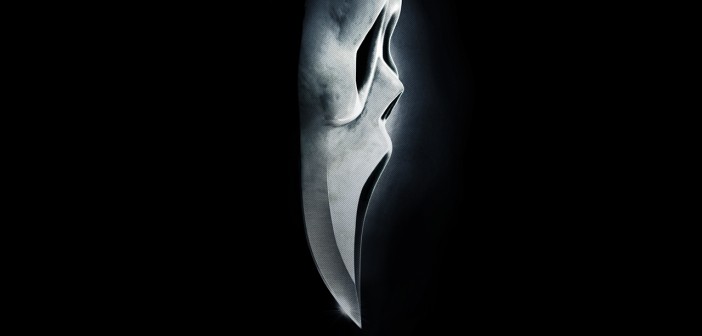There are few things worth an eleven year wait, and I was on the fence about Scream 4, at least until the trailer came out. Ever since, I hopped off the fence and onto the bandwagon. I’ll admit that, while I’m a huge fan of the series, only the first Scream (1996) was worth anything until now. Scream 2 (1997) and 3 (2000), while loads of silly fun, are redundant and small compared to the original, which was a game changer for the horror scene at the time. Kevin Williamson’s screenplay is mostly to thank for that, as it dissected pretty much everything audiences then knew about modern horror movies, and again this year, Williamson took the genre back under the knife, grabbiing the clichés we see every weekend and turning them upside down. Make no mistake, this movie is pure formula; we’ve seen it already, hundreds of times. What makes it fun is Wes Craven’s approach to it. He’s still a master of suspense, after all.
It’s been a long time since Craven was the best horror director around; every director has their misfires. He won’t always direct movies like The Last House on the Left (1972) or Red Eye (2005), but it’s good to know that he still has it in him to pump out a solid thriller. Even lately, or at least since ’96, he’s displayed a genuine flair for comedy and being an actor’s director; maybe not in the strictest sense, but his actors are always having fun. Even in his lesser fare, like Cursed (2005), you can tell that the people involved are having a blast. What makes the Scream series so vividly entertaining, however, has always been the screenplays. Even when Kevin Williamson didn’t write Scream 3, his touch was all over it; he’s a smart writer with a flair for quick dialogue.
Our basic story is fairly simple: eleven years after the last murders in Woodsboro, Sidney Prescott (Neve Campbell) returns home to promote her self-help book on dealing with depression and violent crime, just in time for the anniversary of the first killings. And just in time for them to happen all over again. What gets a little bit more complicated this time? The rules of the killings, the skewing of popular culture in horror films, and the relationships between the characters, both old and new. It’s always a pleasure to see Neve Campbell on the theater screen; I wish she worked more often. She’s as good here as she’s ever been, as are Courtney Cox and David Arquette. The three reprise their long surviving roles as Sidney, Sheriff Dewey Riley, and journalist Gale Weathers, respectively. And of course, there are the high schoolers this time, a cool and collected cast of kids including Emma Roberts as Sidney’s jealous cousin, Jill Roberts; Rory Culkin as our modern horror flick obsessor, Charlie Walker; and Hayden Panettiere as Kirby Reed, the hot girl with attitude.
Who I really feel I should mention, though, is Roger Jackson. He’s never once been on camera during the four Scream films of which he’s been a major part, but you know him as “The Voice” of the Ghostface Killer. He doesn’t get much praise when these films are mentioned, but I sincerely consider him the glue that holds these pieces together. He’s the first thing to come to mind when I think “Scream.” Not Edvard Munch, not the mask, barely even the movie, but him. He employs a scathing sarcasm underneath his predatory growl that makes him unshakable. Remember the opening scene of the first film – a young, scared Drew Barrymore takes an anonymous phone call from a flirtatious man, who soon becomes an angry man, who soon becomes violent. When he, out of left field, threatened to “gut [her]like a fish” and make her watch her boyfriend be torn open, everything we knew about modern horror was changed. He’s the atmosphere, and atmosphere makes good horror. Wes Craven knows that; that’s why he’s one of the best.
In terms of Scream 4 as it stands on its own, it’s a fairly standard slasher film; but it isn’t ever meant to stand on its own. You have to have knowledge of the previous films for this one to make sense, so it gets a pass. And as a slasher film, it succeeds. There are frightening moments, the deaths are realistic and sad, and while the twist might not make sense at first, take a bit of time to think about it afterward and it all pulls together. It’s tightly wound and makes for one hell of a send-off to a series that, for all intents and purposes, made us scream. The thing that made the first Scream so wonderful was that, while it was a bit of a lampoon on the pratfalls of the genre, it took itself seriously as a slasher film. The following two did not. This one does, and it’s a good thing, too, lest we have another generic, know-it-all teen horror film. God knows we don’t need any more of those.

